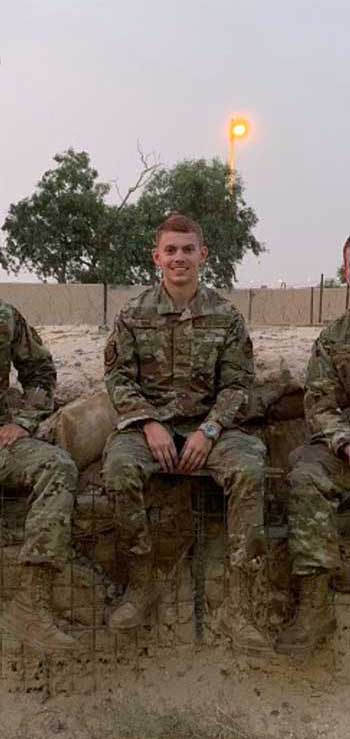I became involved with the WVU College of Law Veterans Advocacy Clinic after witnessing firsthand the difficulties veterans in our state encounter while attempting to access and fully utilize their veteran benefits and legal hurdles.
My military journey began as a member of the 130th Airlift Wing. I completed basic training in San Antonio, Texas, attended tech school in Wichita Falls, Texas, underwent specialty trainings at my base in Charleston, West Virginia, served on a deployment in Ali Al Salem, Kuwait, and participated in a joint task force mission in Washington, D.C.
Later, at the beginning of each college semester, continuing into law school, I struggled to navigate the steps necessary to access and receive my education benefits, including the Post-9/11 GI Bill.
Additionally, I found it nearly impossible to maneuver through the obstacles to receiving VA healthcare for an injury I sustained while serving.
In the fall semester of my second year in law school, Matt White, my mentor/fellow veteran at Steptoe & Johnson, PLLC, and member of their Veterans Inclusion Counsel, invited me to participate in the Michel Late Benedum Chapter of the American Association of Professional Landmen’s annual Veterans Charity Clay Shoot; all of the proceeds benefitted the WVU Law Veterans Advocacy Clinic. I had the unforgettable opportunity to meet the previous year’s student attorneys, along with the clinic’s co-director, Ashley Talbott, who helped me understand the profound impact the clinic had on supporting veterans in all areas of the law, as well as assisting veteran students, like me, in receiving their education and healthcare benefits.
Recognizing I had an opportunity to assist other veterans facing the same challenges I struggled with, I was immediately inspired to apply for a position in the clinic.
The Unique Challenges Faced by West Virginia Veterans
Veterans in West Virginia, like those in many rural areas, face unique challenges when it comes to accessing VA healthcare, VA disability benefits, VA educational benefits, and navigating their personal legal hurdles. In addition to challenges such as VA clinic availability, financial hardship, and awareness of benefits, the predominant issue I see veterans in our state facing is navigating the bureaucracy of the VA system — particularly for veterans who don’t have access to legal advocacy assistance.

Taylor Hinkle in Kuwait.
More than 150,000 veterans currently live in West Virginia, so members of the WVU College of Law Veterans Advocacy Clinic have a unique opportunity to represent a nearly endless number of veterans in litigation before administrative agencies and courts related to benefits, discharge upgrades, employment claims, powers of attorney, medical powers of attorney, family law, property disputes and other civil matters.
In addition, we represent local and national organizations in nonlitigation matters relating to the legal needs of veterans, including regulatory and legislative reform efforts, media advocacy and strategic planning.
How Our Clinic Serves Veterans
Our clinic operates like a well-oiled machine! First, prospective veteran-clients complete an application on our website outlining the legal challenge(s) they are experiencing.
Second, my clinic partner, Hunter Burdette, and I, or one of our other 12 clinic student attorneys, contacts the prospective client and schedules a consultation to see how we can assist them. This is by far my favorite part.
In addition to hearing about the veteran’s legal issue, I have the opportunity to sit down with the veteran and listen to their military stories, struggles, accomplishments, travels and military history. Although this meeting typically lasts only an hour, I’ve been so captivated by these stories that I’ve ended up spending the entire afternoon swapping tales.
Third, following the consultation, Hunter and I decide which co-director should be the supervising attorney for the veteran’s legal issue. Ashley Talbott is a guru in navigating the complexities of the VA and leads all veteran benefit cases, while co-director Jed Nolan, with unmatched expertise in veteran civil litigation, oversees all litigation cases.
Finally, Hunter and I, under the supervision of Ashley or Jed, work diligently to secure the outcome the veteran deserves.
Right now, our clinic has more than 115 active clients, and we have worked tirelessly over the past eight months to obtain the benefits and outcomes they rightfully deserve. We have secured more than $500,000 in back pay for veterans, with benefits projected to exceed $15 million in the future. These benefits provide vital financial support to veterans and their families, contributing to economic stability in communities across our great state.
Additionally, the healthcare and educational opportunities that come with these benefits help improve quality of life, workforce development and community engagement, creating a ripple effect that benefits the entire state of West Virginia.
To illustrate: One morning during class, Hunter and I were contacted by one of our clients asking why he had just received more than $150,000 in his checking account from the VA. We sprinted to our office, checked our mailbox and opened a letter that confirmed he had just been awarded 100% VA disability and would be receiving the full amount of back pay he deserved. This client is now helping to pay all of his grandchildren’s tuitions at West Virginia University.
The Future
Supporting the WVU Veterans Advocacy Law Clinic is a powerful way to directly make a positive impact on both the lives of our veterans and our state. By helping veterans access the benefits and support they deserve, we not only honor their sacrifices but also contribute to the well-being of local communities in West Virginia.
My hope is that with enough support and resources, the clinic will continue to grow with the addition of more student attorneys, allowing us to expand our reach and help even more veterans. An increase in community outreach and awareness, collaboration with local organizations and engagement with veteran assistance programs will help foster this development.
“ Everyone has the ability to make an impact ”
— Trevor Hinkle


